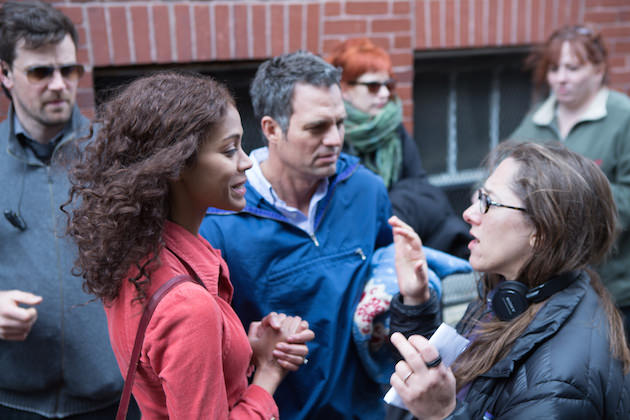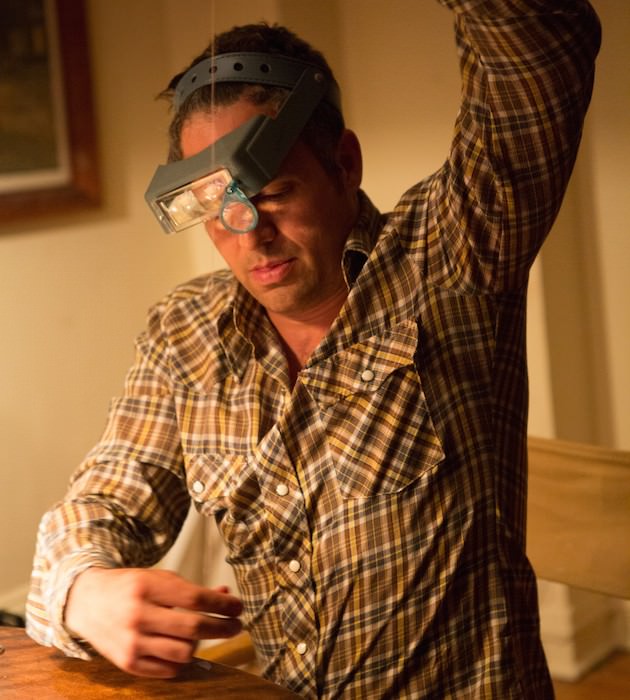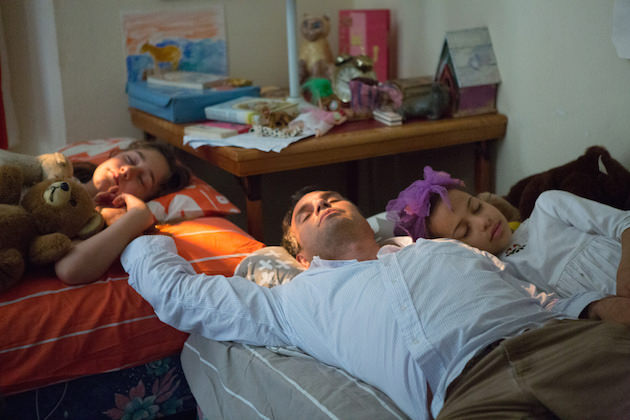Maya Forbes on her Highly Personal, Illuminating Infinitely Polar Bear
Behind the scenes, writer/director/producer Maya Forbes has helped directors and filmmakers tell a lot of stories, but in her directorial debut Infinitely Polar Bear, she’s telling her own.
Her new drama chronicles the eighteen months that Forbes and her sister lived with their bipolar father in Boston in the 1970s while their mother attended graduate school in New York. Although that period was sometimes tumultuous, it also gave her a lot of beautiful memories about her dad— memories that she’s passed on to her own daughters since he passed away in 1998. After years of writing down stories about her father and stories passed down from him, Forbes decided to make a movie about her journey.
The producer of the TV movie The Kennedys and the writer of films like Monsters vs. Aliens and Diary of a Wimpy Kid: Dog Days, Forbes didn’t have to go far to cast a younger version of herself. She cast her daughter Imogene Wolodarsky in the part (and also cast her other daughter in a smaller role). She also cast Oscar nominee Mark Ruffalo as her bipolar father and Zoe Saldana as her mother in the movie, which made its premiere at the Sundance film festival in 2014.
Now that the movie is now arriving in theaters nationwide, I recently had a chance to talk to Forbes about directing for the first time and why she decided to make her story into a film. Below is a slightly edited transcript of our conversation.

What pushed you to turn your experience into a feature film?
I'd been writing about it forever. I started writing about this period in my life when I was a daughter and then I became a mother. I have two daughters of my own and they got to about the age [I was when] everything sort of fell apart and my father had a breakdown. It all kind of catapulted me back into that time and I started telling my daughters stories about my father…

I started also reflecting on all the things I'd learned and the gift I'd gotten from that very difficult time, and I was looking at my kids who were growing up in this culture where they say that kids can't handle anything. [They say] kids have to be protected from everything and I sort of wanted to remind myself that kids actually are really capable. They're kind of fierce and they're resilient and so I made this film. It took me a very long time.
When did you start writing it as a script?
I probably started writing it around 2005. I had a script but it took me years. I'd always written bits and pieces about my father so I took all of that and put that into it. I kept writing scenes and then putting them aside and then writing other scenes. I didn't start from the beginning. I just wrote different moments or took multiple elements from my life [and] designed the scene that sort of illustrated that.
So when you started out, you weren’t writing the script chronologically?
I wrote all these scenes. They weren't even necessarily connected. Some of the first scenes I wrote aren't even in the movie. Then I figured out a starting point and then I sort of chronologically ordered them. Then I started fashioning them into a story and designing a story. It was sort of more of an exploration, I'd say, of different moments and feelings…

You grew up with a bipolar father, so you knew a lot about the disease from personal experience. Did you do any other research about the disease in preparation for making this film?
Not really. I have a lot of bipolar people in my family so I was drawing on memories of him and then also observations as an adult that I didn't have [that family members gave me]. I think I've always done research because I've always been curious about it, because it's been such a large factor in my life. I didn't do specific research for this but it was sort of cumulative over my lifetime.
When you cast Mark Ruffalo in the role of your father, what advice did you give him both about playing your dad and about representing the disease?
I said, 'In terms of playing the disease, we're not gonna play it as a disease. You're gonna play this man— this person who had all of these different elements and sometimes he gets wound up.’
One thing that was interesting— and I've seen this with other bipolar people in my life— when you start getting manic, it just keeps spinning up-up-up. You feed on other people's energy. Stimulations from the outside world get you all wound up so the main thing was 'this was this guy.' He doesn't change when he's manic or depressed. He's still himself. That's always the thing I'm very confused by.
When I see someone who is bipolar getting happy or excited about something, I wonder, 'Are they getting manic or are they just in a good mood?' I don't want to define them as a manic if they're in a good mood.

Did you ask Ruffalo to do any research of his own or do you know if he did any research of his own?
He's had a lot of family too [who are bipolar]… He has personal experiences. I think he did some research on mania certainly. I sent him some film that my father shot of himself when he was manic. I gave him a lot of photos [and] video. I gave him some video of my father speaking…he was attached from 2010 so we had a lot of time to work on the character.
You cast you daughter in one of the main roles. How did you know she was right for the role and what was it like being both her boss and her mother on the set?
It's funny. I say, 'I'm not her boss. I'm her collaborator.' I didn't know it was right but I hoped it was. I think it was the whole way of doing this movie. I didn't know if it was going to work but you hope so. That was my intuition…
It was a little hard because I couldn't be a very present mother even though we were together all day, every day, I was focused on a hundred different things. She would be at the set before I was and often asleep by the time I got home, so we didn't get to process it as we were going, but we had a wonderful creative experience. I think it was really meaningful to her and to me— meaningful cause all my kids now have an understanding of who my father was and what he meant to me.
Going back, is there anything you would change about the production?
On some things— now that I know— I would probably take longer in some scenes. I was writing it [like] 'This is it. This is it so make sure you get it.' If I were to do it again, there are things I would've taken longer with.
How did you overcome the impulse to make everything absolutely accurate, rather than just tell the best story you can, considering that you’re the person who lived this?
Any time you're making a ninety-minute movie, you can't make it accurate because everything has to be compressed and cut into its essence, so what you have isn't going to be exactly true. It's going to be a combination of truths. You're going to have to combine all these true things, and I was grateful for the years I've had as a screenwriter.
I didn't keep a journal, so I'm relying on memories and feelings. The other thing is you can't make it accurate because it's not the 1970s. You're shooting an independent film, trying to recreate the 1970s. I couldn't go to South Station in Boston where we picked up my mother on the train all the time. There was no train station that made sense for the film. You're trying to recreate things that don't exist anymore so that also prevents it from being completely accurate.
What was the reaction when your family saw the final film?
When it premiered at Sundance, my mother, my sister and my father's three siblings were there. For the siblings, it was a gift because my father's been dead for many years and they thought that he'd been brought back to them. Mark captured the essence of who my father was and my mother and sister [were] very happy. They all loved it. It felt like a great version of a memory we shared.
Featured image: Left to right: Mark Ruffalo as Cam Stuart, Imogene Wolodarsky as Amelia Stuart and Ashley Aufderheide as Faith Stuart. Photo by Claire Folger, Courtesy of Sony Pictures Classics



